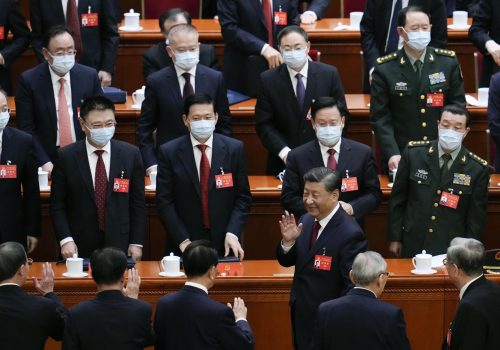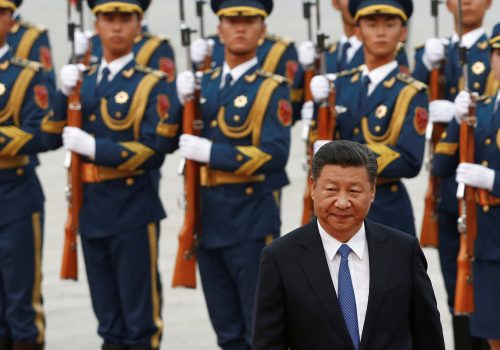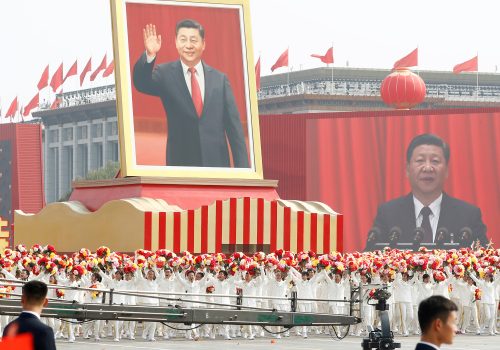What did Xi and Biden just accomplish?
JUST IN
Can a beach getaway repair this relationship? US President Joe Biden and Chinese leader Xi Jinping met for three hours today in Bali, Indonesia, ahead of this week’s G20 summit, with both leaders pledging to get the world’s most important bilateral relationship back on track and agreeing to restart climate talks. There “need not be a new Cold War,” Biden said afterward. Did the two leaders make any progress beyond the talking points? What flashpoints may emerge next? Our Sinologists read between the lines of the post-meeting diplomat-speak.
TODAY’S EXPERT REACTION COURTESY OF
- Michael Schuman (@MichaelSchuman): Nonresident senior fellow at the Global China Hub and contributing writer to the Atlantic magazine
- Jeremy Mark (@jedmark888): Nonresident senior fellow at the GeoEconomics Center and former IMF official and Asian Wall Street Journal correspondent
- Jessica Drun (@jessicadrun): Nonresident fellow at the Global China Hub
Good talk
- “The good news is that the US and China are talking,” Michael tells us, “after an especially icy stretch” that included US House Speaker Nancy Pelosi’s visit to Taiwan and the unveiling of new US export controls to keep cutting-edge technologies away from China. And those talks will continue: Secretary of State Antony Blinken will travel to Beijing to follow up.
- “The bad news,” Michael adds, “is that too often the two sides seem to talk at each other rather than with each other” on everything from economics to human rights. “There still appears to be no acknowledgement from the Chinese of how their actions contribute to soured relations,” he says.
- But in the end, “perhaps the outcome of the meeting was the best we could have expected—that dialogue, and the prospect of more of it, holds out hope that competition won’t boil over into conflict,” Michael says.
Subscribe to Fast Thinking email alerts
Sign up to receive rapid insight in your inbox from Atlantic Council experts on global events as they unfold.

Cooperation or frustration?
- While the two leaders agreed that the United States and China should work together on climate change, debt relief, and food security—the subject of an Atlantic Council forum in Bali over the weekend—“finding common ground won’t be easy,” Jeremy tells us.
- To make progress on food security, “Beijing would have to join in pressuring Russia to allow more exports of Ukrainian grain that have been cut off by its invasion,” Jeremy says. “Russian aggression is the greatest single threat to global food security.”
- On debt relief, which will be a hot topic at the G20, “China is the largest sovereign lender and has resisted taking ‘haircuts’ on its loans as heavily indebted poor and emerging market countries have faced a deepening economic crisis,” Jeremy adds, with China sending no signals that it will change course.
- And there are ample areas where officials aren’t even paying lip service to cooperation. China’s readout of the meeting warned of a “trade war or technology war” while the United States took aim at China’s “non-market economic practices.” Says Jeremy: “The core differences in the economic relationship are likely to continue festering.”
Inside Strait
- In his post-meeting news conference, Biden declared that he does not believe a Chinese invasion of Taiwan to be “imminent.” Jessica pointed out that “each leader reaffirmed their country’s respective positions when discussing Taiwan,” with Biden saying the One China policy is unchanged.
- Biden has repeatedly pledged that the United States will defend Taiwan if the island is attacked, which goes against longstanding US policy of “strategic ambiguity.” Those statements combined with other signals that Beijing perceives to be in support of Taiwanese independence and against the One China policy led to what Jessica saw as the most striking part of China’s readout of the meeting: Beijing’s call on Washington to “match its words with its deeds” on Taiwan.
- Says Jessica: “I’m curious as to whether Biden’s comments were sufficient in reassuring the [People’s Republic of China] that our existing Taiwan policy has endured and will endure.”
Further reading
Sun, Oct 16, 2022
Reading between the lines of Xi’s party congress speech
Fast Thinking By
How should the world interpret his rhetoric about Taiwan? What was conspicuously absent from the speech? Our experts weigh in.
Tue, Oct 11, 2022
Your expert guide to China’s 20th Party Congress
New Atlanticist By
The once-in-five-years event is slated not only to further cement Xi Jinping's rule but also to have impact on a number of policy areas, from China's economy to its relationship with the Global South.
Thu, Jan 28, 2021
The Longer Telegram: Toward a new American China strategy
Atlantic Council Strategy Paper Series By
China presents the most important challenge to the United States in the twenty-first century. To address this challenge, the United States urgently needs "an integrated, operational, and bipartisan national strategy."
Image: U.S. President Joe Biden shakes hands with Chinese President Xi Jinping as they meet on the sidelines of the G20 leaders' summit in Bali, Indonesia, November 14, 2022. REUTERS/Kevin Lamarque


